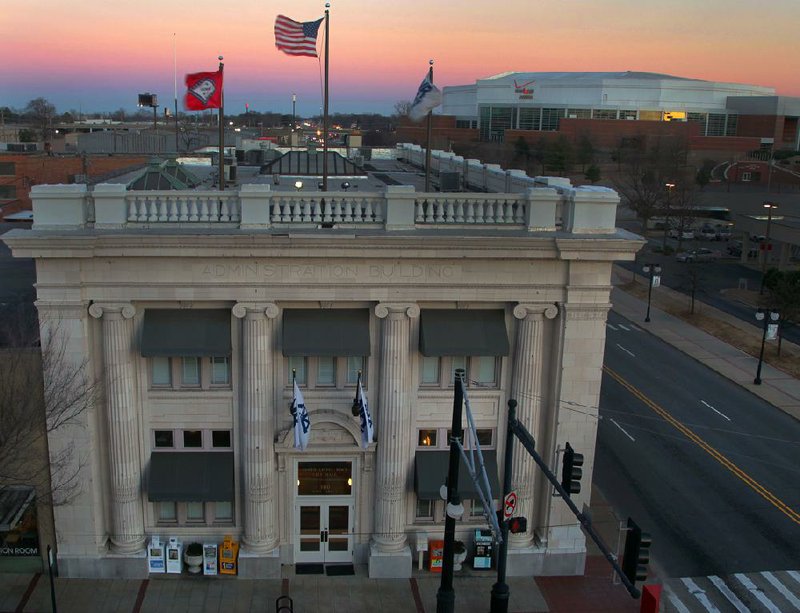Full-time city government employees and all elected officials for North Little Rock will see bigger paychecks starting next month, under a proposal the City Council is to consider today.
The 2.2 percent pay increase is to include everyone but uniformed police officers, who received raises at the beginning of this year as part of their union negotiations. Raises for other city employees weren't part of the 2018 city budget.
The raises are spread over five separate resolutions to cover full-time salaried workers, elected officials, a revised pay schedule for the Fire Department, a revised pay schedule for grade-step, non-uniformed employees, and to amend the city budget to include the increases.
The city's cost for the increased salaries would be $299,861, city Finance Director Karen Scott said.
The proposed raises, to take effect Aug. 11 if approved, will come almost exactly one year after North Little Rock voters passed an additional 1 percent city sales tax Aug. 8. Revenue from the sales tax is divided equally between a five-year, capital improvements program and the city's general fund, which includes city salaries and services.
During the 2018 budget process last fall, Mayor Joe Smith said raises weren't to be awarded this year because of a $400,000 increase projected to hit at mid-year for the city's coverage of employee health insurance premiums. But the premium increase won't happen until next year, he said last week, allowing for the raises.
Smith also said last year that he wanted to build up the city's reserve fund for emergencies such as natural disasters. That fund was at $13 million to begin 2017, according to city figures, but was projected to fall by $4 million by 2019 without the tax increase, city officials repeated throughout the sales tax campaign.
The fund balance had risen to $19 million to begin this year, Scott said last week, though the figure is yet to audited.
"The money we have in the bank is looking really good, and we were told our health insurance won't go up for now," Smith said. "So I felt really comfortable then to give a raise to our employees. Our employees certainly deserve it."
Smith said during last year's tax campaign that the biggest criticism he received during dozens of public meetings concerned the city dipping into the reserve fund to give employee raises at the start of 2016 and 2017, which also included pay bumps for elected officials.
Those raises took away $2.5 million in 2016 and $4.2 million in 2017 from the reserve fund Smith said he wanted to build back up.
"It's important that we are fair to our employees," Smith said. "I have confidence that the citizens of North Little Rock would agree that as long as our balance sheet looks good, that they would support a cost-of-living raise for the city employees."
This will be the third consecutive year City Council members will receive a pay raise after not having any pay increase since 2003. City Council members are paid $10,821 annually and receive a monthly $250 vehicle allowance.
North Little Rock's top annual salaries, all of which will increase by 2.2 percent under the proposal, are: Smith, $122,400; Scott and Chief of Staff Danny Bradley, each $107,517; City Attorney Amy Fields, $103,974; and Police Chief Mike Davis and Fire Chief Gerald Tucker, each $102,517.
Smith, Fields and City Clerk-Treasurer Diane Whitbey, whose annual pay is $72,420, are the full-time elected officials affected. Council members are part-time.
The city's revenue collected so far from its now 2 percent total city sales tax and a 1 percent Pulaski County sales tax is "very, very close to projections," Scott said.
"We continue to be optimistic because of all of the growth in North Little Rock," Scott said when asked how future economic conditions might affect city revenue. "And we're waiting anxiously to see how the Supreme Court ruling on Internet sales tax affects us."
The U.S. Supreme Court ruled, 5-4, in June that states can require sales tax to be collected for Internet purchases even without the online retailer having a physical presence in the state.
Despite the additional money coming in from the new city sales tax, Smith said department heads have been keeping tight budgets and looking at ways to save money instead of spending more.
"Because we got the sales tax passed and continue to tighten our belt, that [reserve] number continued to rise," Smith said. "I wear that fund balance goal like a badge of honor. The bigger it is, the better I think I've done my job."
Metro on 07/23/2018
